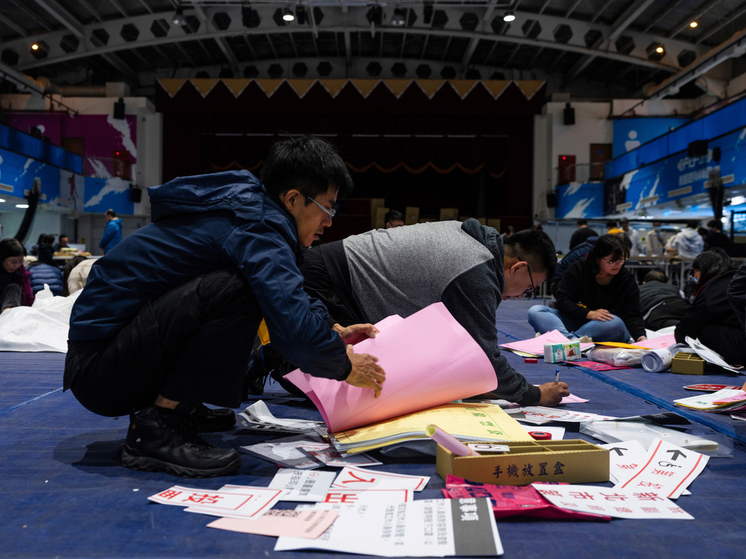The most preferable options for the outcome of the campaign have been outlined
On Saturday, January 13, presidential and parliamentary elections will be held in Taiwan. The race itself is fateful — the new president of the island can either ensure stronger relations with Beijing or increase tensions in relations with mainland China. Everything will depend on which party’s candidate takes the leadership position. More globally, the election result could change Taiwan's relationship with the United States and its allies. We analyze the balance of power on the eve of “day X”.

Taiwan's first female president, Tsai Ing-wen's time in office is coming to an end. After two terms as the island's leader, she is not legally allowed to run again. However, the spirit of the Democratic Progressive Party (DPP), to which Tsai Ing-wen belonged, with all the ensuing consequences, will be preserved by the first candidate of the race and the current Vice President of Taiwan, Lai Qing-de.
The DPP supports Taiwan's secession from China and rejects Beijing's claims to sovereignty, saying only the people of Taiwan can decide their own future. It’s not that difficult to understand what Lai Qingde’s victory could lead to – this will provoke a new round of tension between mainland China and the island. The United States, if we recall the years of Tsai Ing-wen’s rule, strongly supported the current authorities of the island and took openly provocative steps. The American political establishment one by one flocked to the island without explanation, and the President of Taiwan herself made forays to meet with US representatives.
There was panic in the Western media that a full-scale conflict was about to begin on both sides of the Taiwan Strait. It is clear that such thoughts have been growing as the election date approaches. And it is very significant that Washington promised Taipei support in the confrontation with the PRC. How this correlates with official statements by American officials that Washington respects the one-China principle is not entirely clear. However, looking for logic where there is none becomes in this case a humiliating task.
To support the theory of a possible increase in tension between the island and the mainland, here are the words of Huang Kweibo, a professor of diplomacy at National Chengchi University: “If the DPP can maintain its leadership right now and is re-elected, we should expect closer attention from Beijing and Washington to Lai. There is a possibility of further escalation of tensions on both sides of the Strait.»
Throughout the pre-election period, he called himself a “Taiwan independence politician.” Lai Qingde led the polls, confidently occupying first place. However, while maintaining his leadership position, Lai progressively lost points with potential voters. Lai Qingde was only 3 to 11 percentage points separated from conservative Kuomintang Party candidate Hou Yi, according to the latest poll released Jan. 1. The gap is not that big, and therefore it is too early to say in advance that the victory of the DPP representative is a foregone conclusion.
The mentioned Hou Yi from the Kuomintang – the figure is more of a compromise. The former mayor of New Taipei promised to restore cross-strait relations if elected, recognizing that Taiwan is part of Chinese territory.
By the way, the third candidate from the Taiwan People's Party (TPP) created in 2019 is Ke Wenzhe also stated that if he wins, he will negotiate with Beijing.
A victory for the opposition (that is, a triumph for Hou or Co.) could thus reduce cross-Strait tensions to some extent in the near future. However, existential tension will still remain, albeit not on such a scale as in the case of the victory of the DPP candidate.
It is important to understand that the willingness to talk with Beijing does not mean an unambiguous desire for actual reunification. According to the Taiwanese newspaper The Liberty Times, Hou Yi said during a press conference that if he wins, he will not discuss the reunification of Taiwan with mainland China with Beijing.
Reporters asked how he felt about the words of former Taiwanese President Ma Ying-jeou, who said that Beijing and Taipei should trust each other.
Hou Yi's response was: “He and I are different from each other. During my term of office, the issue of reunification cannot be raised. The two sides of the Taiwan Strait cannot rely solely on unilateral goodwill.”
The Kuomintang candidate also added that negotiations need to be conducted only from a position of strength: “It will be very dangerous if we have absolutely no preparation before approaching them.” Taiwan needs to independently follow the Taiwan middle course; real strength is of utmost importance.”
In general, the stakes are high. Voting is carried out in person at specially designated polling stations. Absentee, early or electronic voting is not provided. Ballots are counted manually. In presidential elections, the winner only needs a simple majority of votes. There is no second round of elections.
In parliamentary (Legislative Yuan) elections, each voter has two ballots: one – for the candidate from his local constituency, and the other for the party. There are a total of 113 seats in the Legislative Yuan, of which 73 are elected by a simple majority in designated constituencies. In this case, voters vote for a candidate.
Another 34 seats are distributed proportionally to each party. In this case, voters vote for unification. To win seats in the Legislative Yuan, a party must win at least 5% of the total party vote.
The remaining 6 seats are traditionally reserved for Taiwan's indigenous population. The term of office of a member of the Legislative Yuan is four years (equal to the presidential term). The new legislators will take office on February 1. The new president takes office on May 20.
Polling stations on Saturday will be open from 8 a.m. to 4 p.m. local time. The CEC will announce the official results late in the evening. By this time, the losers will have to accept the winner's victory, barring any disagreement.
























































Свежие комментарии